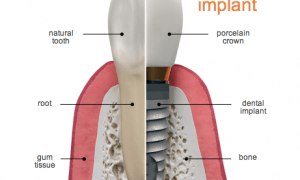Losing a tooth can be a distressing experience, affecting your oral health and self-confidence. Thankfully, modern dentistry offers excellent solutions to restore your smile and improve your quality of life. Two of the most popular options are dental implants and dentures. But how do you know which one is right for you? This comprehensive guide will delve into the intricacies of dental implants and dentures, exploring their pros and cons, suitability, procedures, costs, and long-term outlook. By the end, you’ll be well-equipped to make an informed decision and embark on your journey towards a healthier, happier smile.
What are Dental Implants?
Imagine a small, titanium screw acting as an artificial tooth root, firmly anchored into your jawbone. That’s the essence of a dental implant. This remarkable innovation provides a stable foundation for a replacement tooth, or crown, that looks, feels, and functions just like a natural tooth.
Think of it like planting a tree. The implant is like the root system, providing stability and support for the crown, which is like the tree trunk and leaves. Just as a tree needs strong roots to thrive, a dental implant needs a healthy jawbone to integrate successfully.
What are Dentures?
Dentures, on the other hand, are removable appliances that replace missing teeth. They can be either partial, filling in gaps left by a few missing teeth, or complete, replacing an entire arch of teeth. Dentures consist of artificial teeth attached to a gum-coloured base, which rests on your gums.
Imagine a puzzle piece fitting snugly into a gap. Dentures work similarly, restoring the appearance of your smile and improving your ability to chew and speak. However, unlike implants, they do not provide the same level of stability or prevent bone loss in the jaw.
Advantages and Disadvantages of Dental Implants
Pros:
- Durability: Dental implants are incredibly durable and can last a lifetime with proper care. They are designed to withstand the forces of biting and chewing, offering a long-term solution for tooth loss.
- Stability: Implants fuse with your jawbone, providing unparalleled stability and preventing the shifting or slipping that can occur with dentures. This means you can eat, speak, and laugh with confidence.
- Preservation of Jawbone: Implants stimulate the jawbone, preventing bone loss and maintaining the natural contours of your face. This helps preserve your facial structure and prevent a prematurely aged appearance.
- Improved Oral Health: Unlike dentures, implants don’t require reducing neighbouring teeth for support. This preserves your natural teeth and promotes better oral hygiene.
Cons:
- Cost: Dental implants are generally more expensive than dentures, especially if multiple teeth need replacing.
- Surgical Procedure: Implants require a surgical procedure, which may involve some discomfort and a healing period.
- Time Commitment: The entire implant process, from initial consultation to final restoration, can take several months.
Advantages and Disadvantages of Dentures
Pros:
- Cost-Effective: Dentures are typically more affordable than implants, making them an accessible option for many people.
- Non-invasive: Unlike implants, dentures don’t require surgery. They are custom-made to fit your mouth and can be fitted relatively quickly.
- Suitable for Various Needs: Dentures can be a good option for people who have lost multiple teeth or have insufficient jawbone for implants.
Cons:
- Reduced Stability: Dentures can sometimes slip or shift in your mouth, affecting your ability to eat and speak clearly.
- Discomfort: New dentures can take some time to get used to, and some people may experience soreness or irritation.
- Bone Loss: Dentures do not stimulate the jawbone, which can lead to bone loss over time. This can affect your facial structure and the fit of your dentures.
- Maintenance: Dentures require daily cleaning and occasional relining or rebasing to maintain their fit.
Am I a Suitable Candidate for Dental Implants or Dentures?
The suitability for dental implants or dentures depends on several factors, including:
- Overall Health: Good general health is essential for both options, but particularly for implants, as they require a surgical procedure.
- Jawbone Health: Sufficient jawbone density and volume are crucial for implant success. If you have experienced significant bone loss, bone grafting may be necessary before implants can be placed.
- Oral Hygiene: Maintaining excellent oral hygiene is vital for both implants and dentures to prevent infections and ensure long-term success.
- Lifestyle Factors: Smokers and heavy alcohol consumers may have a higher risk of implant failure.
- Number of Missing Teeth: Implants can replace single or multiple teeth, while dentures are typically used for multiple missing teeth or an entire arch.
Your dentist will conduct a thorough examination, including X-rays and possibly a CT scan, to assess your suitability for each option.
What Does the Procedure Involve?
Dental Implant Procedure:
- Consultation and Planning: Your dentist will assess your oral health, discuss your needs and expectations, and create a personalised treatment plan.
- Implant Placement: The implant, a small titanium post, is surgically placed into your jawbone.
- Osseointegration: Over several months, the implant fuses with your jawbone in a process called osseointegration. This creates a strong and stable foundation for the replacement tooth.
- Abutment Placement: Once osseointegration is complete, an abutment is attached to the implant. This acts as a connector between the implant and the crown.
- Crown Placement: A custom-made crown is fabricated to match your natural teeth and attached to the abutment.
Denture Procedure:
- Consultation and Impressions: Your dentist will take impressions of your mouth to create a model for your dentures.
- Framework Try-in: A wax or plastic model of the denture framework is tried in your mouth to assess the fit and make any necessary adjustments.
- Denture Fabrication: The final dentures are fabricated using the impressions and framework.
- Fitting and Adjustments: Your dentist will fit the dentures and make any final adjustments to ensure a comfortable and secure fit.
Aftercare and Maintenance
Dental Implants:
- Maintain Excellent Oral Hygiene: Brush and floss regularly, and attend regular dental check-ups and cleanings.
- Avoid Hard or Sticky Foods: Initially, avoid foods that could put excessive pressure on the implant.
- Protect Your Implants: Avoid habits like chewing on hard objects or using your teeth as tools.
Dentures:
- Remove and Clean Daily: Remove your dentures daily and clean them thoroughly with a denture brush and cleaner.
- Soak Dentures Overnight: Soak your dentures in water or a denture-cleaning solution overnight to keep them moist and prevent warping.
- Handle with Care: Dentures can be fragile, so handle them with care to avoid dropping or damaging them.
- Regular Dental Check-ups: Visit your dentist regularly for check-ups and adjustments to ensure your dentures continue to fit properly.
Cost Considerations and Insurance Coverage
The cost of dental implants and dentures can vary significantly depending on several factors, including:
- Number of Teeth Being Replaced: The more teeth that need replacing, the higher the cost.
- Type of Implant or Denture: Different types of implants and dentures are available, each with varying costs.
- Complexity of the Procedure: If bone grafting or other additional procedures are required, the cost will be higher.
- Location and Dentist: Dental fees can vary depending on the location of the practice and the dentist’s experience.
Dental insurance may cover a portion of the cost of implants or dentures. It’s essential to check with your insurance provider to understand your coverage and any limitations.
Long-Term Outlook: What to Expect
Dental Implants:
- Lifespan: With proper care, dental implants can last a lifetime. The implant itself is very durable, and the crown can be replaced if necessary.
- Potential Complications: Although rare, potential complications include infection, implant failure, and damage to surrounding teeth or nerves.
Dentures:
- Lifespan: Dentures typically last 5-10 years, but they may need relining or rebasing to maintain fit.
- Potential Issues: Common issues include soreness, difficulty eating, and changes in facial appearance due to bone loss.
Making the Right Decision: Which is Best for Me?
Choosing between dental implants and dentures is a personal decision that should be made in consultation with your dentist. Consider your individual needs, preferences, and budget.
Dental implants are an excellent option for people who desire a long-term, stable, and natural-feeling solution. They are ideal for those who are committed to maintaining good oral hygiene and are willing to invest in a more expensive but potentially lifelong solution.
Dentures are a more affordable option that can be suitable for people who have lost multiple teeth or have insufficient jawbone for implants. They can also be a good temporary solution while waiting for implants or for those who are not suitable candidates for surgery.
By carefully weighing the pros and cons of each option and discussing your needs with your dentist, you can make an informed decision that will restore your smile and improve your quality of life. Contact us for further information and our team can help choose what’s best for you!
References




